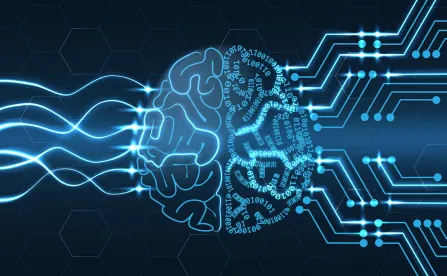AI has the potential to revolutionize healthcare worldwide. In drug discovery, AI has already shown success. Sumitomo Dainippon Pharma and the UK-based AI company Exscientia developed DSP-1181 to treat obsessive compulsive disorder. In clinical trials for treatment of solid tumors, the clinical-stage, AI-powered biotech BERG’s BPM31510 (ubidecarenone) has already been granted Orphan Drug Designation by the FDA to treat pancreatic cancer and epidermolysis bullosa, a rare skin disorder causing blistering. AI-led drug discovery for COVID-19 is also in the works.
AI Advantages in Drug Discovery
AI can analyze vast amounts of data quickly and predict outcomes using unbiased algorithms less prone to human mistakes. AI can inspire drug discovery by searching and analyzing data on behalf of chemists and recommending subsequent steps. Machine learning (ML), an AI application that allows computer algorithms to improve automatically without explicit programming, can be used to discover molecules that bind to and modify target proteins. ML can optimize the synthesis of molecular compounds, factoring in the availability of chemical components needed. Combining AI with automated systems (e.g., robots), scientists can test more compounds in shorter time, with more accuracy and reproducibility. These computerized systems can collect and search large amounts of records, allowing AI to rapidly identify patterns not readily discernible to humans. Integration of AI in the drug discovery and testing pipeline would increase efficiency and reduce expense.
AI and COVID-19
Since AI and ML require a large volume of data and networking capabilities, computing capacity is critical. In March 2020, IBM, The White House, and the US Department of Energy created the COVID-19 High Performance Computing (HPC) Consortium to provide supercomputing capacity for COVID-19-related research. In its first phase, the HPC Consortium, consisting of industry, government, and academia members worldwide, almost doubled its computing capacity. The amount of data available on COVID-19 also has grown substantially. In its second phase, the HPC Consortium is focusing on projects to help researchers identify potential near term therapies to improve the outcome of COVID-19 patients within a six-month timeframe. Projects include understanding and modeling of patient response to the COVID-19 virus, learning and validation of vaccine response models, evaluation of combination therapies using repurposed molecules, and epidemiological models.
AI and supercomputing capacity provided through the HPC Consortium allows researchers to rapidly search a vast volume of data to identify candidate drugs and compounds in drug discovery. A team at Michigan State University screened data from about 1,600 FDA-approved drugs and found at least two potential candidate antibacterial drugs, proavine and chloroxine, that might be combined and repurposed to treat COVID-19. A team of scientists from PostEra, an ML chemistry startup, processed more than 2,000 compounds from crowdfunded submissions in 48 hours, and quickly created databases with more than 14 billion molecules available worldwide, in their search for a compound to block a key protein of SARS-CoV-2, the virus that causes COVID-19.
AI-based drug discovery is within the purview of the FDA, which has outlined a multi-step drug development process including discovery and development, preclinical research, clinical research, FDA drug review, and FDA post-market drug safety monitoring. The FDA’s Technology Modernization Action Plan will expand and modernize the Agency’s technology information systems to ensure that “rapid advances in product translate into meaningful results for American consumers and patients.”
The Legal and Regulatory Impact of AI
“We need AI to help us because the low hanging fruits are long gone: we need to apply our very best approaches to deliver therapies for new generations.” AI will bring about a new era in drug discovery and repurposing for new and complex diseases including COVID-19. With that, AI also brings conundrums – for example, who is the inventor of a drug designed and discovered by AI? The US Patent & Trademark Office and the European Patent Office both rejected patent applications naming AI as an inventor, holding that only natural persons can be inventors. Most patent offices and courts around the world provided a similar traditional approach. Then, is the inventor the person who created the algorithm of AI? Or the person who designed the data to feed AI? Can nobody get a patent if an AI system is fully responsible for the invention without human involvement? AI will require us to adopt a new legal and regulatory approach sooner or later.




 />i
/>i
